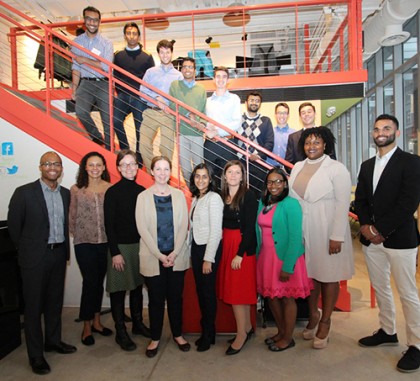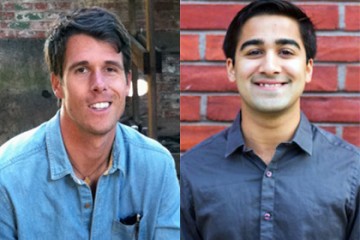Ten local startups will get a boost through this year's Social Innovation Lab run by Johns Hopkins University. The finalists, announced this week, range in focus from telemedicine and teacher burnout to revitalizing Baltimore's vacant lots.

Image caption: The 2016-17 Johns Hopkins Social Innovation Lab cohort
Within the accelerator program, the budding ventures will see support through funding, mentorship, office space, and workshops for the next six months. The 10 ventures—whittled down from 53 applicants—will ultimately vie for a $20,000 top prize at a pitch competition in late April.
Run by Johns Hopkins Tech Ventures, the Social Innovation Lab nurtures enterprises that work to improve public welfare and transform communities. Program director Darius Graham says he's seen the local focus increase each year, with the majority of the 2016-17 cohort aspiring for direct impacts in Baltimore.
A change for this year's applicants, says Graham, was allowing only projects that have moved concretely beyond the "idea" phase to gain some traction—through awards or formal partnerships, for example.
"We've found that the folks who have gotten the most out of the program have been the ones that are further along," he says. "We're a supplement to the work they're doing."
Last year the lab made the shift to invite applications from beyond the Johns Hopkins community. Graham says four of the 10 teams this time don't have any JHU affiliation.
Since its start in 2011, the Social Innovation Lab has supported 52 startups, with those ventures going on to raise more than $13 million and impact the lives of about 268,000, the program estimates in its 2016 Impact Report.
Meet the 2016-2017 Social Innovation Lab cohort
Beacon: A mobile app for anonymous, text-based group therapy that uses advanced natural language processing techniques to increase accessibility for patients and efficiency for mental health care providers. Shrenik Jain, JHU undergrad in the Whiting School of Engineering; and Ravi Shah and Satya Bommaraju, Whiting School alums
Bent Carrot: Strengthening urban communities by reducing food insecurity and promoting healthful eating. Community member Mark Corser
B-360 / BCCC STEM Scholars: Exposing residents to STEM fields and increasing diversity in these arenas by meeting students at their level and providing job readiness and a pipeline starting at the GED or community college level. Community member Brittany Young
Intelehealth: Improving access to comprehensive primary health care for the last mile through telemedicine. Neha Goel, JHU grad student in the School of Medicine; Amal Afroz Alam, JHU grad student in the Whiting School of Engineering; and Emily Eggert, Whiting School alum
The Listening Lab: A music education program that teaches 4th- and 5th-grade students awareness, concentration, and intentional listening skills through classroom sessions and live orchestra concerts. Community members Rebecca Smithorn and AnnMarie Stockmeyer
Project Charmify: Bringing small-scale investment to Baltimore communities in the form of vacant lot revitalization and community-driven programming. Elyse Oliver and Jack Alpert, JHU undergrads in the Krieger School of Arts & Sciences; and Darius Irani, JHU undergrad in the Whiting School of Engineering
ReLac: Developing vending machine technology and related services to provide breast pumping supplies to working moms. Meg Stoltzfus, staff in the JHU Office of Work, Life and Engagement
Squadz: A social activity and venue-booking platform that connects the community to play pickup sports while generating revenue for community centers and recreation facilities. Nikhil Panu, JHU grad student in the Whiting School of Engineering
Touching Young Lives: Providing education and tools to help lower the occurrence of Sudden Infant Death Syndrome across Maryland. Shantell Roberts, community member
The Whole Teacher: Providing health and wellness services to teachers in order to help reduce burnout and increase retention. Jenna Shaw, School of Education alum









